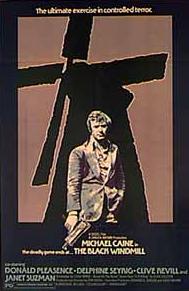 THE BLACK WINDMILL (1974)
THE BLACK WINDMILL (1974)

THE BLACK WINDMILL poster artwork
MICHAEL CAINE.....Major John Tarrant
DONALD PLEASENCE.....Cedric Harper
JOSEPH O'CONOR.....Sir Edward Julyan
JOHN VERNON.....McKee
JANET SUZMAN.....Alex Tarrant
DELPHINE SEYRIG.....Ceil Burrows
Produced and Directed by DON SIEGEL
Written by LEIGH VANCE
REVIEW BY PENELOPE GILLIATT
The Black Windmill, directed by Don Siegel from a screenplay by Leigh Vance and based on Clive Egleton's Seven Days to a Killing, specializes in double-crosses that may be quadruple. Michael Caine, the dubious and super-cool hero of the story, is working for what overlord? He is separated from his wife (Janet Suzman, the fine Royal Shakespeare Company actress who was the mother in A Day in the Death of Joe Egg). Separated by his job, perhaps. He stands for male stoicism and getting on with it. She stands for domesticity and hysterical maternalism, and that is fair enough, maybe, in a story about prototypes. Their child has been kidnapped. There are hints of gunrunning to Ireland by the villains. Conferences of amazing poshness are held in the house of Sir Edward Julyan (Joseph O'Conor), who apologizes to the members of General Purposes Intelligence for "dragging you out all this way." He adds, "It's the damned flu," as he looks round his palace of a house with sniffly and quite unfair resentment, considering its comfort and luxe. One of the Intelligence people is Donald Pleasence as Cedric Harper, a disgusted-looking man suffering from a less lofty perpetual cold---or maybe from a germ he suspects life itself to be secreting---who folds up pieces of Kleenex as if they were expensive dinner napkins, and then shreds the evidence with an automatic reflex to destroy all relics of himself.
There are moments when the film seems to be out-Bonding 007 in gadgetry. For instance, much use is made of an attache case with an enormous detonating power; it could well make one nervous about possible triggers in the handles of doctors' bags. There is even a mischievous reference to Sean Connery ("Sean Kelly, I mean"). The film is full of set pieces that are nearly up to 007 at his groomed best, except that Michael Caine---an actor with the face of an Indian brave, who could play a Buster Keatonish Senecan comedian if he wanted to---is no mere gamesman at showing off. He makes peril seem real. There is a terrific scene in France when he nearly drowns in a gush from exploded barrels of raw red wine. The unthinkable pursued by the undrinkable. The Mr. Harper of Donald Pleasence, absorbed by sneezing and by folding his paper tissues, begins to assume the crushing obsequiousness of a headwaiter who doesn't approve of your order. Like all the other members of General Purposes Intelligence, he actually works for the Department of Subversive Warfare. His familiars are the paraphernalia of hijacking, telephone-tapping, the bugging of committee rooms. "Let's talk in the garden," says Sir Edward Julyan socially to the Pleasence character, as if what he wanted to talk about were the qualities of his rhododendrons. The unloved and unlovable Cedric Harper's most personal dreams must be not of rhododendrons but of explosive briefcases, hidden tape recorders, and the dreaded burglary of a locked drawer in his office, which is above an auction room. He shrinks from Sir Edward's outdoor stroll and obviously thinks enviously of his own indoor plants, which he sprays in the presence of smokers, because, he says reprovingly, like a New York cabdriver, they have an allergy to tobacco. Of intimacy with anything but killing, running noses, plant spraying, and the intricacies of subterfuge, he knows nothing. He is a chilling creation, acted with potent brilliance. Soul and trust have been drained from him. The residue is controlled panic, a will to small-scale power, and paltry sources of impatience. His handmaiden is a vicarage-spirited, downtrodden middle-aged secretary (Joyce Carey), who looks as if she had been given a Getty fortune when he lets her have an extra hour for lunch.
The sound effects of the film are very good---the burble of well-bred auctioneering going on below Pleasence's tetchy hellhole of an office, for instance---and so is the use of locations and of the general unhectic kindliness of English men and women doing dusty jobs. The high-up officials are goons. The parvenu Michael Caine character---hellbent on hunting killers who use a Polaroid, and a planted seducer (Delphine Seyrig), and a recorded scream of a kidnapped boy---is himself hunted by Scotland Yard, Paris police, and members of M.I.5 fed up with doing "M.I.6's dirty work." As it should in this sort of carefully made nullity of a film, even the benevolence of ordinary bystanders begins to look like a cover, and the most innocent people going about their jobs start to have the aura of gunrunners or of people in the employ of some unidentified and sinister Other.
From the June 3, 1974 edition of THE NEW YORKER.
Review © 1974 THE NEW YORKER. All Rights Reserved.
Poster artwork © 1974 UNIVERSAL PICTURES. All Rights Reserved.
Title and logo designed by Karen Rappaport

[ FILM | THE BLACK WINDMILL | HOME ]



